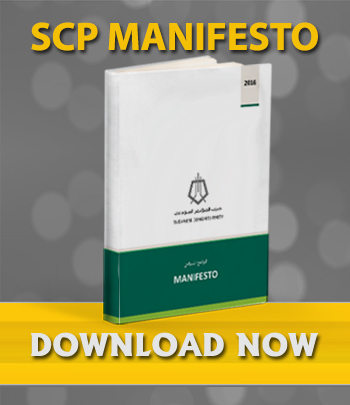GOALS & OBJECTIVES
This program aims to achieve the following goals and objectives:
2.1 Strategic Objectives:
2.1.1 Maintaining national unity and promoting national belonging:
Sudan is a typical example of a country that enjoys a wealth of riches in terms of its diversity which includes; its customs, traditions, cultures and affiliations. Instead of this diversity in Sudan being a source of strength, the country is threatened with total destruction and collapse because of the state's failure to adopt the right for cultural diversity and it has become very clear that the national feeling that binds all the people of Sudan and connects them together as the children of this country is heading towards extinction and therefore, the Sudanese Congress Party is working for the sake of preserving national unity and to strengthen the sense of National belonging towards this country through a series of measures detailed in this program.
2.1.2 Transition from centralism to pluralism and diversity:
Since its Independence; The Sudanese state has been established on a centralised basis. This has angered great sections of society that have found themselves marginalised by the state in terms of their care, development and inclusion. The centralised state in Sudan did not only cause economic regression, but also caused wars and the killing of hundreds of thousands of our sons and daughters, and later caused the division of the country and placed large parts of it under the likelihood of secession.
The current Salvation regime represents not only the National Congress Party and the authority of the Islamic Front Party, but also the complete failure of the system of governance, which has alternated the exercise of power under different names from independence to this day. So, as we put this program into the hands of the Sudanese citizen, we look forward to moving the country from Centralism and Federalism and opening it to the values of multiculturalism and diversity, which is the essence of national reconstruction, without being biased towards one group or favouring another. Providing equality to both people and groups without regard to tribe, ethnicity or culture and uniting them under their one homeland which is Sudan.
2.1.3 Transition from the current dictatorship to a democratic society:
At the end of its’ colonization, Sudan inherited a democratic system which consisted of political parties and an electoral process that led to the formation of a government and the installation of the first elected Sudanese parliament from which the declaration of independence was proclaimed. The experience of democratic governance in the country after independence did not develop further due to many factors, one of which was the Sudanese political environment itself is not democratic, with a composition and discourse that is monolithic and incapable of politically expressing the diversity of Sudan, which led to military coups and wars as its most significant outcome which in turn was a consequence of the shortcomings of the political environment. The aim of this program, which we are keenly aware, is written under the dark shadow of the coup d’état regime of the Salvation Front, is to move the country, alongside the other political and social forces, from one of a dictatorial regime to a stable and democratic society and make the current Salvation Front the last dictatorial regime to impose itself on the country.
2.1.4 Sustainable Development:
(Sustainable development with democratic and humanitarian characteristics)
Development in its various forms includes: applying scientific principles and modern technologies to production, tackling poverty and providing employment opportunities, satisfying basic needs, raising standards of living by continuously increasing goods and services, consolidating and expanding the internal market and the interdependence and integration of the economy. In our assessment it is primarily by extending the freedom of choice in an open to society that we can achieve its democratic and humanitarian characteristics.
Given our country’s current lack of development, changing this can only come about through careful planning and incorporating the cultural, scientific, economic, social, institutional and legal policy framework. However, in this more general document there is insufficient space to cover our full vision for this development so we will only refer to the key issues:
● Development conditions:
The fundamental development condition is the existence of an authority that makes development its primary challenge. An authority that reflects the interests of society and mobilizes all its resources and efforts towards regeneration and progress.
● Development Gateway:
The foundation for this regeneration process is the creative transition of the country from a pastoral agricultural one into to a modern society. The gateway to achieving this is through utilizing our social capital, by changing the prevailing traditional mindset from one based on routine, repetition and inertia to one based on creative thinking, inquiry, experimentation, innovation, initiative, independence and responsibility. All this in addition to engendering a new spirit towards work, time and public money.
2.2 Current Objectives:
2.2.1 Restoring peace by ending the war, healing its effects and eradicating its causes.
2.2.2 The overthrow of the dictatorial regime and transition to democracy.


